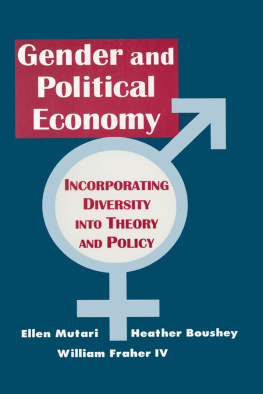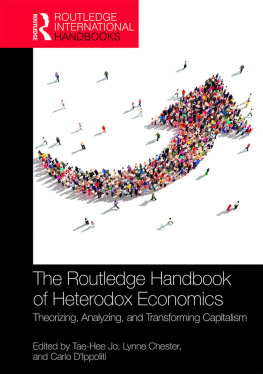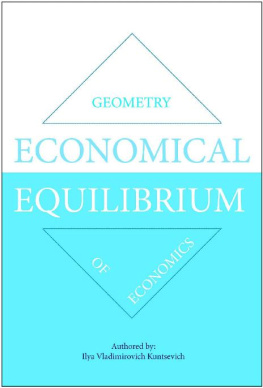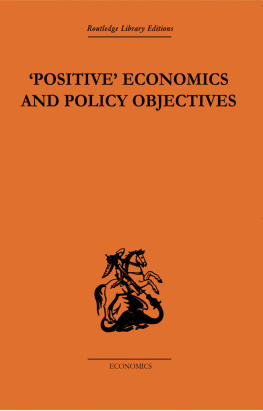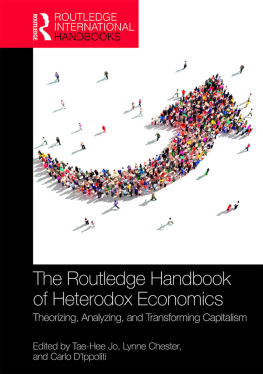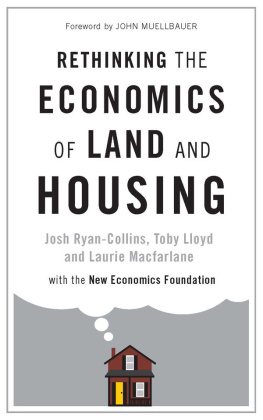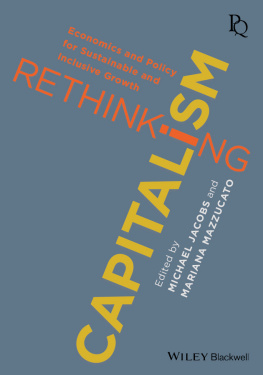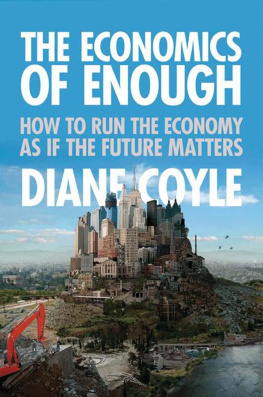The New School of Economics
The Platform and Theory Behind the New Physiocrats
Philip Allan
T ABLE OF C ONTENTS
The New Rules for Industrial Organization:
The Problems with Picking Winners
The New Rules for a Functioning Market:
Guardians of Transparency
Perfect Information and Perverse Incentives:
Publish salaries, education availability
The New Rules for Trade:
Protectionism vs. Compensatism
A Special Thanks
Id like to thank those who supported me during this journey, and helped contribute to this book:
Tobin Shields, CPA, CA, CBV, and lecturer at the University of Waterloo
Dr. E. Naimbe, Editor
Kristina Dancheva, Illustrator
Gergana Georgieva, Chief Co-ordinator
Aneliya Kaleva, Advisor on Publication Printing
Usman Malik, Cybersecurity Advisor and Developer of our Web Platform
Kevin Silk, SEO Advisor
Dean Attali, Technology Policy Expert
Tom Bainbridge
Daniel McCarthy
Pepijn Schreurs
Serhat Altin
Darijo Milievi
Luis Ramirez
Antonio Gomez
Jeremy Laurent
Sergei Bryzhak
Marcin Nickiewicz
Imagine a place of great beauty, where every detail from the bench you sit on, to the lamp that illuminates your street is crafted with the essence, artistry, and finest materials of your region. How were societies able to afford such grand architecture hundreds of years ago, while todays cities are adorned with grey concrete and glass? Do you dream of going to work without commuting through traffic? Consider a place where space is abundant and used wisely where you could enjoy the sights without worrying about car pile-ups, stop-and-go highways, and busy streets.
Good infrastructure always seems to be in short supply, and governments often have difficulty funding it. When it is built, the value of the land near the infrastructure rises in value, and its owners reap the benefits, but the rest of the community doesnt gain. In fact, it makes it more expensive and less accessible to you. Wouldnt you too like to benefit from these projects in some way? Do you wonder why your community can never seem to afford adequate infrastructure no matter how much the economy grows?
We allow space to be taken from us and monopolized. We no longer control our skylines nor how our buildings look. Space is taken and used inefficiently. Land is not treated as precious, despite its scarcity. Is a single-storey parking lot the best use for prime real estate when it could accommodate more levels? How about vacant homes used by speculators, or held empty by banks; could those not be put to better use? Those who were lucky enough to be born in years past managed to monopolize space at a lower price; space that their children now cannot afford. Meanwhile, our tax dollars are being used to build infrastructure near other peoples homes, while a few lucky homeowners benefit and see their property values soar. Those same people lose their incentives to work as they earn more from speculating on property.
Imagine being rewarded for your hard work, instead of having your income taxed away and often squandered by your government. If you work, and are contributing to your family and to society, why should you have to worry about your earnings; shouldnt you have ample to live, eat, and enjoy life? If youre struggling with low wages and high prices, does it make you feel underappreciated by your workplace and society at large? If youre a higher income earner, who worked hard to achieve such a salary, is it not unfair that the government takes half your wages? Shouldnt your efforts be recognized?
And why, despite revolutionary communications technologies, are we wasting so much time each day on inconsequential tasks? Commuting to work, following trivial rules, and endless bureaucracy are monopolizing precious time. Why are our working hours growing longer while our national wealth and productivity grows with new technology? Finally, we ask why, despite our modern production techniques, are goods built to lower standards, with planned obsolescence?
We think its time for something new.
The New Physiocrats are a political-economic framework and certification body. We are a movement established on a new way of economic thinking, what we refer to as the New School of Economics. We completely transcend left and right wing politics, and we are not a compromise between the two. We stand for natural fairness and justice, as opposed to artificially engineered outcomes that are imposed upon us. We support individuals doing what they enjoy, and what they do best; respecting individuality, not equity of outcomes. We ensure that individuals are fully compensated for their efforts. We believe in maintaining and promoting the cultures, traditions, and architecture of each region, so that the world has variety for us to enjoy.
We guarantee dramatically rising purchasing power for all citizens with our program, not only through the vagaries of good policy, but also through direct cash payments. With fascinating, innovative policies, we promise opportunities for all, not just a select few. We pledge to do so while simultaneously providing the absolute best environment for entrepreneurs and business, and while preserving and restoring our natural environment. We believe in eliminating waste and misuse of our physical space, so that we all have plenty to live in. We believe in maximizing our free leisure time, so that there is vastly more for everyone. We believe in long-term thinking, not strictly short-term decision making. And whats even more unique? We accomplish this through a series of automatic mechanisms that are built in to our new system, as opposed to tiresome bureaucracy and political squabbling.
This is not a platform that can be implemented piecemeal it is a sum of its parts. Each piece of the platform machinery depends on another. Remove one, and the others stop. Implement them all, and a new, bright vision for the world, and for our lives, can begin.
Each economic school of thought over the past half-century failed to produce its stated outcomes. In periods before that, those that did achieve success proved they could not deliver sustainable results.
These goals included: providing a high standard of living for the entire population, eliminating poverty, full employment, complete capacity utilization, high growth rates, eliminating boom-bust cycles, efficient allocation of resources, and social cohesion. Policies implemented to achieve these outcomes at times produced positive results, but they were limited.
Mercantilism (the pursuit of trade surpluses above all else) stifled healthy competition, limited consumer choice, and resulted in imperial wars over resource acquisition. Marxism, in its various forms, requires no introduction. Severe misallocation of resources, a lack of incentives, and curtailed liberties sealed its fate in history. Asian corporatist economies, Anglo-Saxon market economies, and Nordic social democracies were arguably the most successful. However, even these models reached their limits, and their flaws were exposed. The Asian model suffered through bouts of serious resource misallocation and bad loans hallmarks of state-directed growth. Japan was the poster child for these issues with its lost decades, and China eventually faced its own challenges. Anglo-Saxon economies struggled with stagnating median incomes, financial crises, widening inequality, and a loss of their national unity. A lack of national identity led to regional independence movements. The Nordic model invited the indolent, and those with sinister intentions, to take advantage of its generous welfare state; and left its hardest working contributors under a burden of painfully high taxes on their labor.


